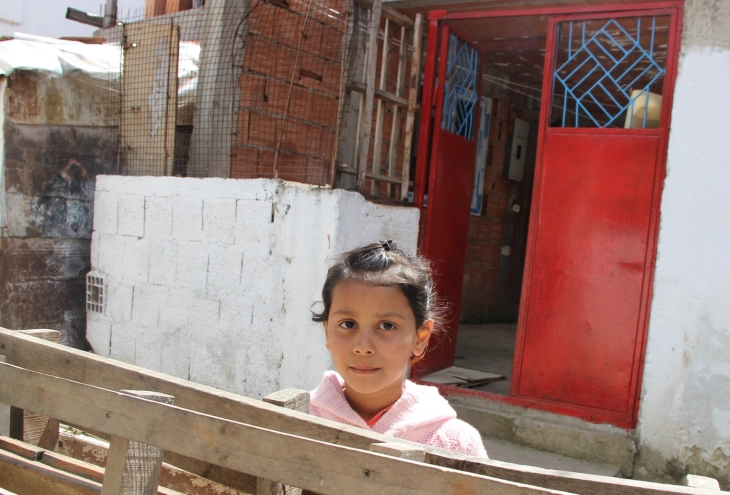DiGiovanni: Building a society free from discrimination, for every child
- All children everywhere have the right to a childhood with dignity, respect and worth. Unfair treatment and discrimination against children based on their families’ social status, ability, ethnicity, what language they speak, gender, religion and other grounds, limits their potential to grow and flourish, said UNICEF Representative Patrizia DiGiovanni in a written statement Thursday on the right to childhood free of discrimination.
- Post By Angel Dimoski
- 13:44, 17 August, 2023

Skopje, 17 August 2023 (MIA) – All children everywhere have the right to a childhood with dignity, respect and worth. Unfair treatment and discrimination against children based on their families’ social status, ability, ethnicity, what language they speak, gender, religion and other grounds, limits their potential to grow and flourish, said UNICEF Representative Patrizia DiGiovanni in a written statement Thursday on the right to childhood free of discrimination.
Having access to equal opportunities and best possible outcomes, wrote DiGiovanni, doesn’t mean being treated identically; some children and young people need more support, or different type of support than others, to overcome barriers and difficulties.
The Committee on the Rights of the Child in the most recent Concluding Observations of North Macedonia’s progress to ensure the realization of children’s rights, commends the laws and strategies developed to protect children from discrimination.
“The country has developed good legal and system framework including the implementation of the new disability assessment model, with a human rights approach, based on the International Classification of Functioning, Disability and Health (ICF), the National Deinstitutionalization Strategy (2018-2027) and the adoption of the Law on Primary Education as a legal basis for the inclusion of students with disabilities in the general education system,” wrote DiGiovanni.
However, she added, the Committee also expressed serious concern at the existence of stereotypes and social norms that perpetuate discrimination against children, in particular against Roma children and children with disabilities and highlighted the importance of indivisibility and interdependence of all child rights.
According to DiGiovanni, indivisibility and interdependence of all child rights means that rights cannot be picked up depending on circumstances. When promoting child participation, adequate nutrition or quality education, DiGiovanni said, we should also promote inclusion and apply non-discrimination principle.
“To make the Primary Education Law and the disability assessment model based on ICF a reality for children with disabilities, the country needs to increase financial and human resources for their implementation; to improve the availability and adequacy of schools, buildings, transports, and spaces making them fully accessible, and to expand community services for children with disabilities. But children cannot fully experience an inclusion if they face stigma. We must address the existence of prejudices that have an impact on the marginalization and discrimination of children with disabilities in accessing health, education, and protection services and participation in the society,” said the UNICEF Representative.
DiGiovanni noted that there is a complex relationship between poverty and discrimination. Discrimination contributes to poverty, but poverty may also isolate some people and impose a social stigma, which results in discrimination.
“Children coming from poverty-affected families often face discrimination when trying to access basic social services. They also lack support from the community because of societal stigma. In North Macedonia one in three children are at risk of poverty and 12 percent of children aged 5-17 experience multidimensional poverty,” stressed DiGiovanni.
The UNICEF Representative added that Roma children are disproportionally represented among children at risk of poverty. “More than 20 percent of them are excluded from primary education in North Macedonia. The spread of early marriage in Roma communities also reduces opportunities for education, especially for girls. The risk of child marriage is much higher for Roma girls than non-Roma girls due to poverty, gender norms and cultural and social practices. Early marriage also increases the risk of adolescent pregnancy,” wrote DiGiovanni.
According to DiGiovanni, more work must be done to alleviate child poverty in order to prevent intergenerational transmission of deprivation and discrimination. “We need strengthened social and child protection services, social service workforce able to identify children at risk of poverty, violence and neglect, and improved social transfer system for children and their families,” she said.
DiGiovanni said society cannot move forward if it doesn’t entrench the principle of non-discrimination and equity in its vision for the future.
“This is achievable and can start from early years. Children are not born with prejudices; they learn societal norms from their parents and other caregivers,” said DiGiovanni.
She noted that good parenting programmes, support to social and emotional development of children, nurturing empathy, sharing and acceptance of differences, prevention of bullying and violence, can contribute to raising generations who will measure their success by the level of fairness and equity in the society.
“This year, when North Macedonia celebrates 30 years since it ratified the Convention on the Rights of the Child and 30 years since UNICEF officially established cooperation after the country became an independent state, we are committed more than ever to support partners in their efforts to build a more peaceful, prosperous, and just society - a society free from discrimination, for every child,” said DiGiovanni in her statement.







